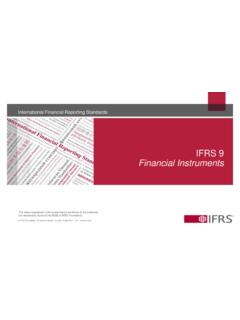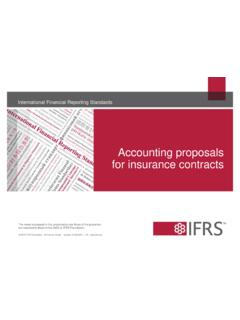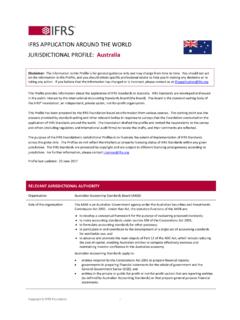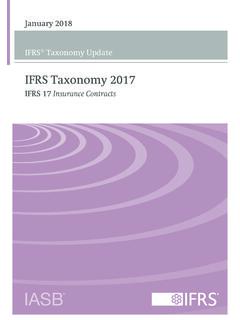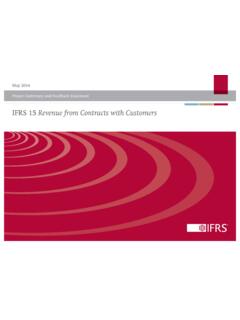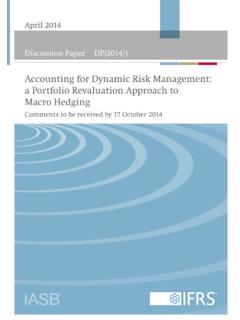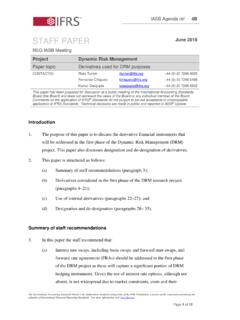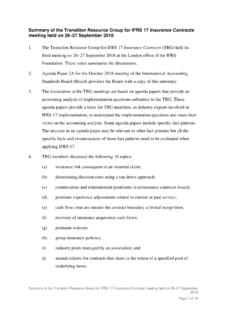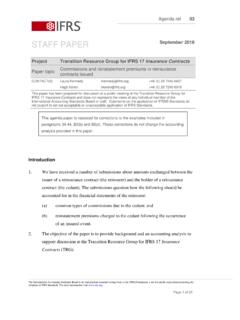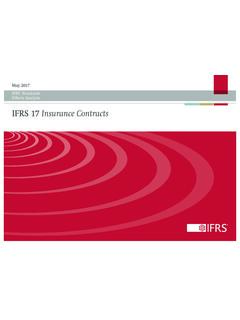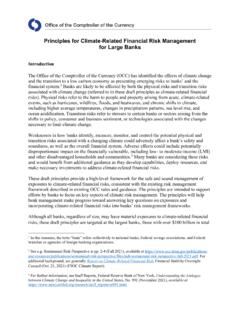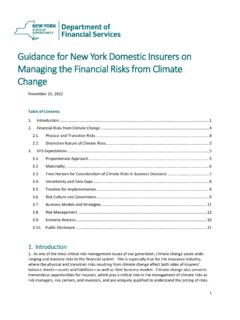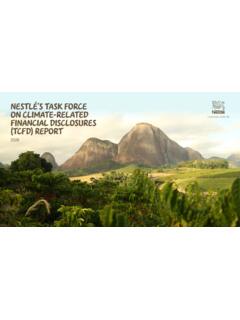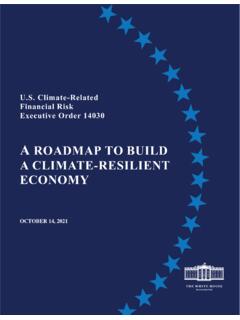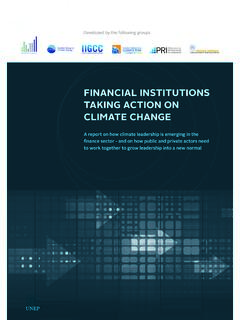Transcription of Effects of climate-related matters on financial statements
1 Effects of climate - related matters on financial statements | November 2020 | 1 November 2020 Effects of climate - related matters on financial statementsClimate change is a topic in which investors and other IFRS stakeholders are increasingly interested because of its potential effect on companies business models, cash flows, financial position and financial performance. Most industries have been, or are likely to be, affected by climate change and efforts to manage its impact. However some companies, industries and activities will be affected more than Standards do not refer explicitly to climate - related matters . However, companies must consider climate - related matters in applying IFRS Standards when the effect of those matters is material in the context of the financial statements taken as a whole.
2 Information is material1 if omitting, misstating or obscuring it could reasonably be expected to influence decisions that primary users of financial statements (hereafter, investors) make on the basis of those financial statements , which provide financial information about a specific company. For example, information about how management has considered climate - related matters in preparing a company s financial statements may be material with respect to the most significant judgements and estimates that management has table below sets out examples illustrating when IFRS Standards may require companies to consider the Effects of climate - related matters in applying the principles in a number of Standards.
3 The list is non-exhaustive there could be other instances where climate - related matters are relevant when applying IFRS Standards, for example those on the measurement of defined benefit obligations. related information can be found in an article by Nick Anderson, member of the International Accounting Standards Board. This educational material complements that article, adding for example This document is intended to support the consistent application of requirements in IFRS Standardsspecific paragraph references to IFRS requirements to assist those applying IFRS Standards. For purposes of illustration, the descriptions in the table do not always explain the relevant requirements completely; it is therefore important to refer to the requirements in the Standards when preparing financial statements .
4 This document does not address management addition to the specific requirements outlined in the table below, IAS 1 Presentation of financial statements contains some overarching requirements that could be relevant when considering climate - related matters . For example, paragraph 112 of IAS 1 requires disclosure of information not specifically required by IFRS Standards and not presented elsewhere in the financial statements but that is relevant to an understanding of any of the financial statements . This paragraph, together with paragraph 31 of IAS 1, requires a company to consider whether any material information is missing from its financial statements ie a company is required to consider whether to provide additional disclosures when compliance with the specific requirements in IFRS Standards is insufficient to enable investors to understand the impact of particular transactions, other events and conditions on the company s financial position and financial performance.
5 Companies will therefore need to consider whether to provide additional disclosures when compliance with the specific requirements in IFRS Standards is insufficient to enable investors to understand the impact of climate - related matters on the company s financial position and financial performance. These overarching requirements in IAS 1 may be especially relevant for companies whose financial position or financial performance is particularly affected by climate - related Companies may find the IFRS Practice Statement 2 Making Materiality Judgements useful in assessing whether the effect of climate - related matters is material. The article by Nick Anderson includes further information on making materiality of climate - related matters on financial statements | November 2020 | 2 IFRS Standards2 Effects of climate - related matters on financial statements IAS 1 Presentation of financial StatementsParagraphs 25 26, 122 124, 125 133 Sources of estimation uncertainty and significant judgements If assumptions a company makes about the future have a significant risk of resulting in a material adjustment to the carrying amounts of assets and liabilities within the next financial year.
6 IAS 1 requires disclosure of information about those assumptions and the nature and carrying amount of those assets and liabilities. This means disclosure of assumptions about climate - related matters may be required, for example when those matters create uncertainties that affect assumptions used to develop estimates, such as estimates of future cash flows when testing an asset for impairment or the best estimate of expenditure required to settle a decommissioning obligation. Companies must present that disclosure in a manner that helps investors understand the judgements that management makes about the future. Although the nature and extent of the information provided can vary, it might include for example the nature of the assumptions or the sensitivity of carrying amounts to the methods, assumptions and estimates underlying their calculation, including the reasons for the 1 also requires disclosure of the judgements (apart from those involving estimations) that management has made that have the most significant effect on the amounts recognised in the financial statements .
7 For example, a company operating in an industry particularly affected by climate - related matters might test an asset for impairment applying IAS 36 Impairment of Assets but recognise no impairment loss. That company would be required to disclose judgements management has made, for example, in identifying the asset s cash-generating unit if such judgements are among those that have the most significant effect on the amounts recognised in the company s financial concernIAS 1 requires management to assess a company s ability to continue as a going concern when preparing financial statements . In assessing whether the going concern basis of preparation is appropriate, management takes into account all available information about the future, which is at least, but is not limited to, 12 months from the end of the reporting period.
8 If climate - related matters create material uncertainties related to events or conditions that cast significant doubt upon a company s ability to continue as a going concern, IAS 1 requires disclosure of those uncertainties. When management has concluded that there are no material uncertainties related to the going concern assumption that require disclosure but reaching that conclusion involved significant judgement (for example, about the feasibility and effectiveness of any planned mitigation), IAS 1 requires disclosure of that ..2 This column cites paragraphs that support the explanations provided in the table. climate - related matters may also be relevant in applying other paragraphs in IFRS See Agenda Decision: IAS 1 Presentation of financial statements disclosure requirements relating to assessment of going concern (July 2014).
9 Effects of climate - related matters on financial statements | November 2020 | 3 IFRS Standards2 Effects of climate - related matters on financial statements IAS 2 InventoriesParagraphs 28 33 climate - related matters may cause a company s inventories to become obsolete, their selling prices to decline or their costs of completion to increase. If, as a result, the cost of inventories is not recoverable, IAS 2 requires the company to write down those inventories to their net realisable value. Estimates of net realisable value are based on the most reliable evidence available, at the time that estimates are made, of the amount the inventories are expected to 12 Income TaxesParagraphs 24, 27 31, 34, 56 IAS 12 generally requires companies to recognise deferred tax assets for deductible temporary differences and unused tax losses and credits, to the extent it is probable that future taxable profit will be available against which those amounts can be utilised.
10 climate - related matters may affect a company s estimate of future taxable profits and may result in the company being unable to recognise deferred tax assets or being required to derecognise deferred tax assets previously 16 Property, Plant and Equipment and IAS 38 Intangible AssetsIAS 16 paragraphs 7, 51, 73, 76 IAS 38 paragraphs 9 64, 102, 104, 118, 121, 126 climate - related matters may prompt expenditure to change or adapt business activities and operations, including research and development. IAS 16 and IAS 38 specify requirements for the recognition of costs as assets (as an item of property, plant and equipment or as an intangible asset).
